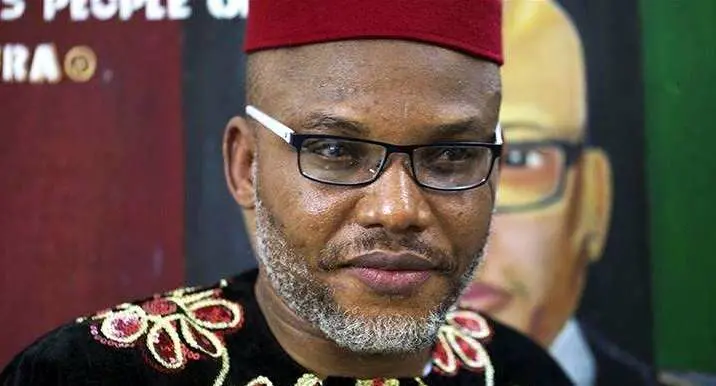Africa
Nnamdi Kanu: When a Nation Jails Its Own Reflection -By Patrick Iwelunmor
Let the man go home. Let him see the sky beyond the narrow window of confinement. Let the South-East exhale once more. In releasing Kanu, Nigeria would not lose its authority; it would reclaim its soul.

Sometimes a nation imprisons a man, believing it is saving itself, only to discover that the cell was built around its own conscience. Such is the saga of Nnamdi Kanu, no longer merely a question of law or loyalty, but a mirror in which Nigeria must confront its own humanity, or what remains of it.
For years, Kanu has waited in confinement, suspended between the rhetoric of rebellion and the rigidity of power. To some, he is the agitator who dared to question the sanctity of the republic. To others, he is the echo of a wounded people, seeking the dignity of being heard. But beyond these easy binaries lies a more fragile truth: that of a man who has aged in solitude, and of a nation that seems to have misplaced the tenderness that once gave it strength.
We often speak of justice in the language of retribution, as though to punish were to purify. Yet justice, in its purest form, is not forged in the iron of the law but drawn from the mercy of the heart that wields it. Kanu has been accused of treason and terrorism, but he has been convicted of neither. Courts of competent jurisdiction, including the Court of Appeal, have ruled in his favour, declaring his extraordinary rendition from Kenya unlawful. International observers have raised the same concern. And yet he remains detained, not, perhaps, because of what he has done, but because of what he has come to represent.
The irony is profound. Across the northern plains, men who once terrorised entire communities now sit at tables of negotiation and forgiveness. Some who bore arms against the state have been received as “repentant bandits,” rehabilitated and reabsorbed into society. Yet, in the South-East, a man whose weapon was his microphone remains confined. It is a contradiction that unsettles not only a region but the moral rhythm of the republic itself.
President Bola Ahmed Tinubu, whose politics has long been anchored in dialogue and inclusion, understands what it means to challenge power and still believe in its promise. His own journey from exile to leadership is a testament to resistance refined by reflection. And Lateef Fagbemi, the Attorney-General of the Federation, whose quiet dignity I once observed during the Synagogue Church building collapse trial at the Lagos High Court, is a man known for fairness rather than force. These are men capable of discerning that there are moments when the law must bow gently before the higher wisdom of compassion.
Under Section 174 of the 1999 Constitution, the Attorney-General holds the power to institute, take over, or discontinue any criminal proceeding on behalf of the Federal Government. It is a responsibility granted not for political convenience, but for the rare moments when the nation’s moral pulse must guide its legal hand. Through a simple act of nolle prosequi, Lateef Fagbemi can bring this prolonged prosecution to an honourable close — an act not of defiance, but of discernment.
Critics have argued that Kanu’s broadcasts ignited unrest in the South-East. It is fair to acknowledge that his words, at times, carried more heat than harmony. Yet the turmoil in the region did not begin with his voice; it began with a history of exclusion, unaddressed grievances, and economic neglect that turned silence into protest and protest into despair. To reduce a complex regional pain to the rhetoric of one man is to overlook the deeper fractures that still cry for attention.
Even if the government, for reasons of state, hesitates to enforce the subsisting court orders that discharged him, it can still act on moral grounds. Compassion is not weakness; it is courage in its most human form. To release Nnamdi Kanu now would not be a retreat before dissent, but a gesture of statesmanship, an affirmation that the strength of a nation lies not in its ability to punish, but in its capacity to forgive.
Every government faces a defining moment when it must decide whether to rule by the letter of the law or by the spirit of humanity. This, perhaps, is such a moment. Tinubu and Fagbemi stand before not just a legal question, but a moral one: can a nation that speaks of reconciliation still practise retribution? Can a government that seeks peace with those who once bore arms not find understanding for a man of words?
Fagbemi, as the chief law officer of the federation, stands at the intersection of legality and humanity. His intervention would not merely affirm the independence of his office, but renew faith in the Constitution’s deeper promise that the law, at its heart, exists to protect, not to persecute. By exercising his constitutional discretion to discontinue Kanu’s trial, he would remind the world that Nigeria’s justice system still possesses a conscience capable of mercy.
Kanu’s continued detention serves neither justice nor peace. It prolongs resentment, deepens mistrust, and sustains the perception that unity in Nigeria is conditional. His release, on the other hand, would speak with quiet eloquence that the Nigerian state can be firm without being harsh, powerful without being vindictive, and unified without being unjust.
Let the man go home. Let him see the sky beyond the narrow window of confinement. Let the South-East exhale once more. In releasing Kanu, Nigeria would not lose its authority; it would reclaim its soul.
For in the end, nations are not remembered for how sternly they silenced their dissenters, but for how wisely they restored them. The highest triumph of power is not in subduing others, but in conquering the self. And sometimes, to heal a nation, one must first set its prisoner free.























